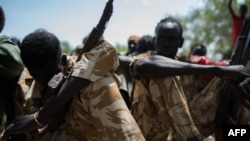The United States, Britain and Norway say they are concerned about the continued recruitment of tens of thousands of child soldiers by parties on both sides of the conflict in South Sudan. Experts warn these youngsters face grave physical dangers and miss key parts of childhood, like school and family. A civil war in South Sudan is now in its fifth year.
In a statement released Monday, the three countries commonly referred to as “the troika,” said forces loyal to the government, an SPLA-IO faction led by First Vice President Taban Deng Gai, and forces loyal to rebel leader Riek Machar, are all guilty of keeping and recruiting child soldiers.
The troika statement reiterates what it calls “the great concern expressed by the IGAD Council of Ministers at the continued employment of child soldiers” by the parties to the conflict. IGAD stands for Intergovernmental Authority on Development, an eight-nation trade group in eastern Africa.
Officials from the troika say they are appalled that South Sudanese children are bearing the brunt of the crisis. In December 2017, the U.N. children's agency, UNICEF, estimated that nearly 20,000 children have been recruited by the country's various armed groups. The UNICEF spokesman in South Sudan, Tim Irwin, said the number of children being recruited to fight has actually risen since 2016.
“We have an estimated 19,000 who remain in the ranks of armed forces and armed groups. We have seen an upsurge in the recruitment of children since the fighting escalated last July, July 2016, so the number of children being recruited is increasing. We have not had any significant releases of child soldiers since 2016,” Irwin told VOA's "South Sudan in Focus."
The UNICEF report said an entire generation of children is at stake as the youngsters face death, injury, hunger, disease, recruitment, forced displacement and an absence of education.
Mark Weinberg, public affairs officer at the U.S. embassy in Juba, says reports by the Ceasefire and Transitional Security Arrangements Monitoring Mechanism, or CTSAMM, confirms that all armed parties to the conflict in South Sudan have continued to recruit and keep child soldiers.
“CTSAMM has verified the existence of child soldiers in western Bahr el Ghazal, Jonglei and Central Equatoria, and reported ongoing recruitment of child soldiers in the Western Equatoria, Unity and Upper Nile states. They have seen recruitment by all sides including the SPLA-IO led by Taban Deng Gai and SPLA-IO led by Riek Machar,” Weinberg told South Sudan in Focus.
Agel Machar, spokesperson of the SPLM-IO faction led by Vice President Gai, denies his group recruits child soldiers.
“We in the SPLM-IO do not condone in any way shape or form child recruitment or the use of children in warfare. We are emerging out of a civil war and we have to make sure we clean our forces in the cantonment sites so that they meet the standards of international law, Machar said in comments to South Sudan in Focus.
Agel Machar - who is not related to Riek Machar - said Gai’s faction works to ensure that child soldiers are “demobilized and handed over to UNICEF or any other institution that can assist them.”
A spokesperson for the SPLA-IO faction was not available for comment on the troika statement, but in the past, Riek Machar’s forces have repeatedly denied accusations of recruiting child soldiers.
The troika statement said the deployment of child soldiers with militia group Mathiang Anyoor in the Yei area “is the responsibility of SPLA government forces.”
SPLA spokesperson Brigadier General Lul Ruai Koang strongly denied the army recruits children into its ranks.
“We have not been involved in the recruitment of child soldiers anywhere in the country. Secondly we do not have a separate army called Mathiang Anyoor that is made up mostly of child soldiers anywhere in the country. The recruitment which was done in 2011 was purely in response to a national call made after the country was attacked in Heglig by the North,” Koang told South Sudan in Focus.
Weinberg said all parties identified in Monday’s statement are in clear violation of international and national law, and the agreements pertaining to the current conflict.
“Within 30 days from the December 24 signing of the Cessation of Hostilities Agreement, parties to the agreement should have demobilized any child recruited or enlisted by their group to UNICEF,” said Weinberg.
He also said the CTSAMM has still not received any verification from either party or UNICEF that such a process was completed by January 24.
UNICEF estimates that around 10,000 child soldiers were released in 2013, but since then, more children have been recruited by government and rebel forces.
Weinberg said it is also true that in some cases, the parties are making efforts to return child soldiers to their families.
“The troika strongly encourages all the parties to cooperate with UNICEF to release all children employed in the war without delay. It is the responsibility of all parties to ensure that the children of South Sudan are given hope for a better future,” he said.
The recruitment and use of child soldiers are prohibited by the August 2015 Agreement on the Resolution of the Conflict in the Republic of South Sudan, International Humanitarian Law, and reiterated in the December 21, 2017 Agreement on Cessation of Hostilities, Protection of Civilians, and Humanitarian Access signed by all stakeholders in Addis Ababa, Ethiopia. South Sudan is the world's youngest country.







